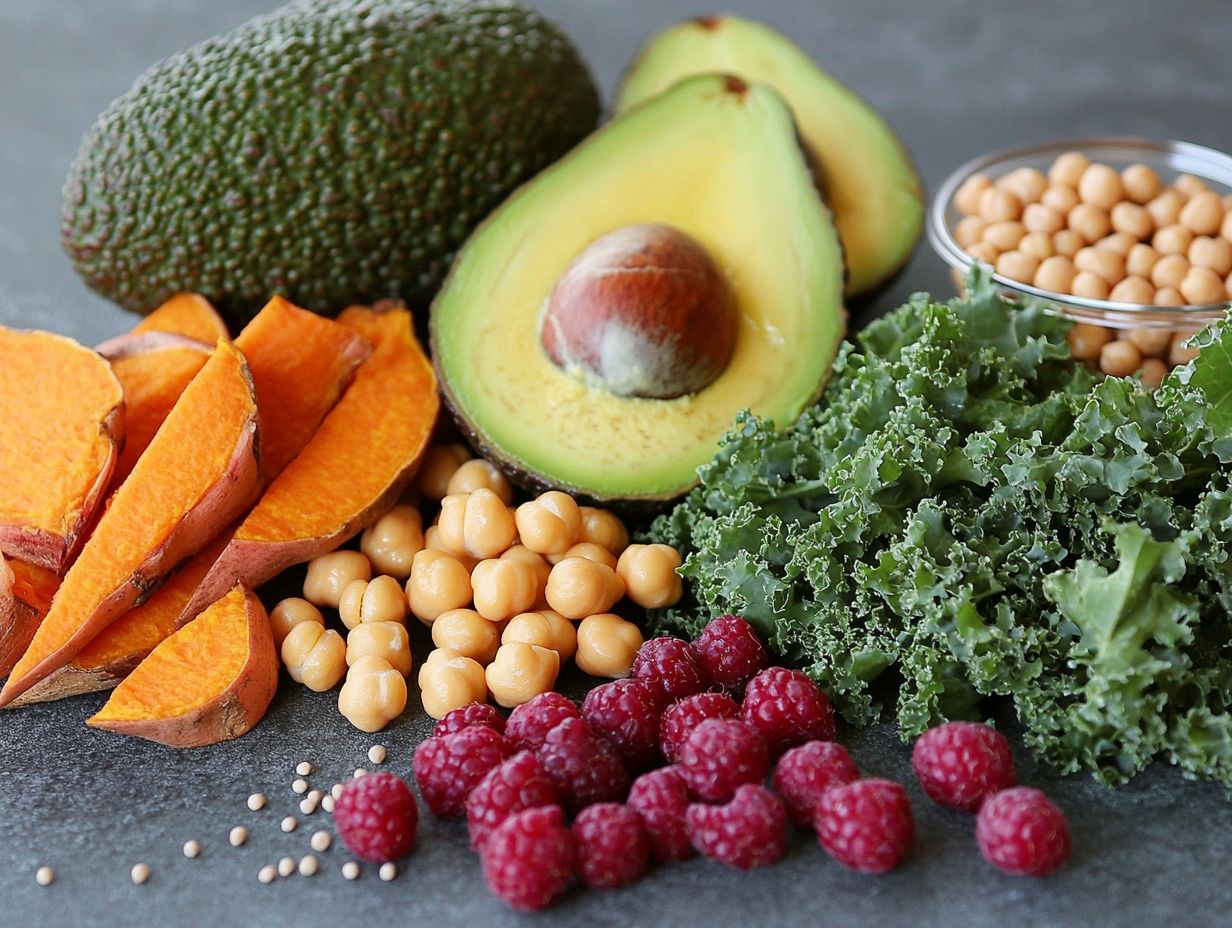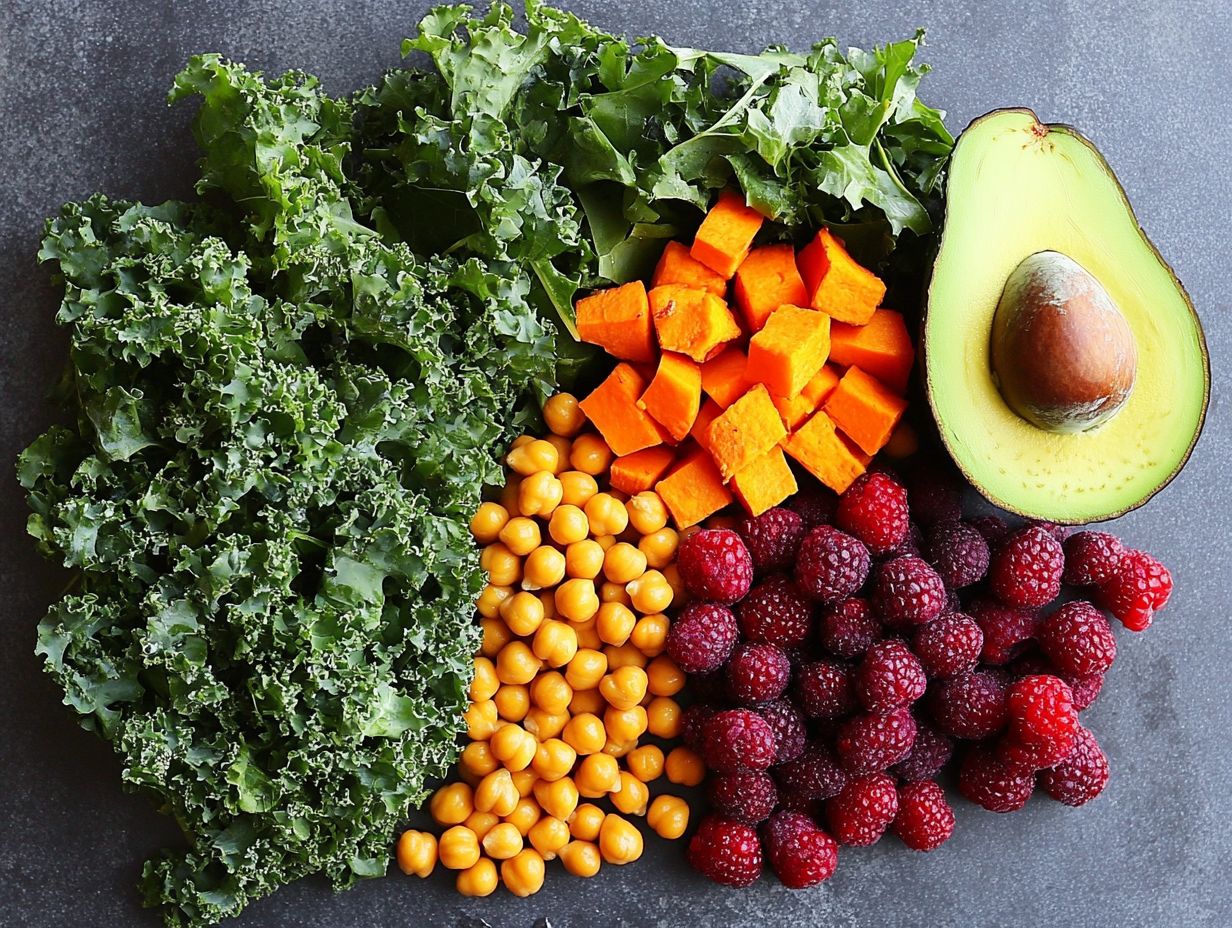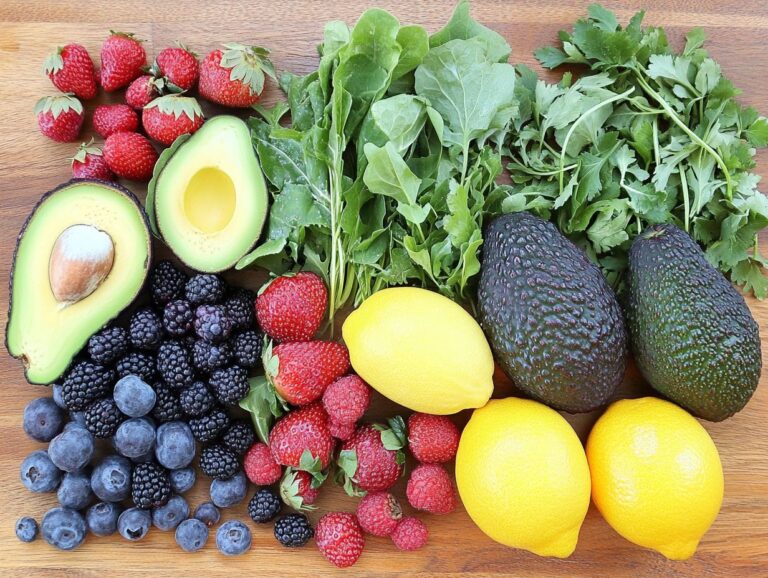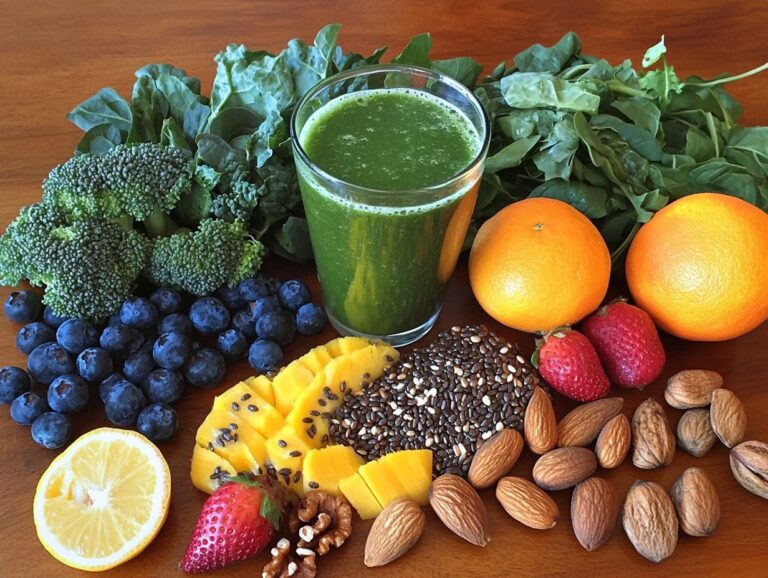Hypothyroidism, also known as an underactive thyroid, can negatively impact your overall health. Adopting a vegan diet may serve as a beneficial intervention by supplying essential nutrients and anti-inflammatory properties that support thyroid health. This article will explore how a plant-based diet can nourish the thyroid, highlight which foods to include and avoid, and offer helpful tips for transitioning to a vegan diet.
What Is Hypothyroidism?

Hypothyroidism is one of the most common endocrine disorders, resulting from an underactive thyroid gland that fails to produce adequate amounts of thyroid hormones. This condition can lead to a wide range of symptoms, including fatigue, weight gain, and increased sensitivity to cold, significantly impacting an individual’s quality of life and potentially leading to obesity.
The prevalence and incidence of hypothyroidism are influenced by various factors, including autoimmune diseases, with autoimmune thyroiditis often being the underlying cause. Additionally, socioeconomic factors, gender, education, and ethnicity can all affect the prevalence and incidence of hypothyroidism. Studies like the Adventist Health Study-2 provide insights into how diet and lifestyle influence the occurrence of this condition.
What Is a Vegan Diet?
A vegan diet is a plant-based eating regimen that excludes all animal products, including meat, dairy, and eggs. Typically, vegan diets focus on whole foods, incorporating a variety of fruits, vegetables, whole grains, legumes, nuts, and seeds.
Research indicates that vegan diets are associated with improved health outcomes, such as effective weight maintenance and a reduced risk of chronic diseases, as well as ethical and environmental benefits.
Some individuals may choose to follow a lacto-ovo vegetarian diet, which includes dairy and eggs, while others adhere strictly to vegan principles. When properly planned, both types of diets can provide all essential nutrients and support overall health.
How Can a Vegan Diet Help with Hypothyroidism?
Adopting a vegan diet can have numerous health benefits, particularly for individuals with hypothyroidism. A vegan diet helps reduce inflammation, provides essential nutrients, and fosters a healthy gut environment, all of which are beneficial for thyroid health.
A vegan diet offers numerous benefits for individuals with hypothyroidism as it helps reduce inflammation, provides essential nutrients, and fosters a healthy gut environment.
Studies indicate that a plant-based diet can mitigate inflammation, commonly observed in autoimmune diseases like hypothyroidism, by incorporating foods rich in antioxidants and phytochemicals.
Additionally, a balanced vegan diet ensures adequate intake of vital nutrients such as calcium, iodine, vitamin D, B12, and zinc, all of which are crucial for proper thyroid function. This is particularly important for individuals with hypothyroidism, who may need to pay extra attention to their nutrition.
Lastly, promoting gut health through dietary fibers may enhance overall metabolic efficiency.
1. Reduces Inflammation
A vegan diet is anti-inflammatory, which offers significant benefits for individuals with hypothyroidism, an autoimmune disease characterized by chronic inflammation.
This diet emphasizes nutrient-rich foods such as leafy greens, berries, nuts, and whole grains, all of which help lower inflammation markers in the body.
Plant-based foods are abundant in antioxidants and phytonutrients that reduce oxidative stress and support immune function. For example, berries like blueberries and strawberries are high in flavonoids, which can help diminish the body’s inflammatory response.
Additionally, omega-3 fatty acids found in flaxseeds and walnuts combat inflammation, thereby protecting the thyroid gland.
Overall, this dietary pattern provides a holistic approach to managing autoimmune conditions by enhancing well-being through a balanced intake of various plant-based nutrients.
2. Provides Essential Nutrients
A well-planned vegan diet can supply all the essential nutrients needed for proper thyroid function, including calcium, vitamin D, B12, iodine, and zinc, which are often lacking in traditional diets.
These nutrients are crucial for maintaining hormonal balance, supporting metabolism, and preventing complications associated with hypothyroidism. For instance, calcium and vitamin D work together to promote bone health, which is especially important as individuals with thyroid issues face an increased risk of osteoporosis.
Vitamin B12 is vital for energy production and neurological function, while iodine serves as a key building block for thyroid hormones; inadequate intake can lead to various thyroid-related problems. Zinc plays a significant role in immunity and is essential for converting the inactive thyroid hormone T4 into the active form, T3.
Fortunately, a variety of vegan sources, such as fortified plant milks, nutritional yeast, seaweed, legumes, and nuts, can provide these nutrients, demonstrating how a well-planned diet can effectively support thyroid health.
3. Promotes a Healthy Gut

A vegan diet is rich in dietary fiber, which plays an important indirect role in supporting thyroid health and function by promoting a healthy gut. This fiber acts as a prebiotic, nourishing the beneficial gut bacteria that help maintain a balanced microbiome.
Optimal gut health enhances the body’s ability to absorb essential nutrients, including iodine and selenium, both of which are crucial for proper thyroid function. Vegan foods such as legumes, whole grains, nuts, seeds, and fermented vegetables like sauerkraut and kimchi can significantly improve the diversity of gut flora.
By fostering the growth of healthy microbes, these plant-based foods can lead to improved digestion and an enhanced ability to convert thyroid hormones into their active forms, thereby promoting hormonal balance and boosting energy levels.
What Foods Should You Eat on a Vegan Diet for Hypothyroidism?
The most beneficial foods for a vegan diet aimed at managing hypothyroidism include a variety of plant-based proteins, sea vegetables, and foods rich in selenium and zinc.
1. Plant-based Proteins
Plant-based proteins are essential components of a vegan diet, providing the body with the amino acids necessary for overall health, particularly for individuals with hypothyroidism.
These proteins are sourced from plants such as legumes, nuts, seeds, and whole grains. Plus helping maintain muscle mass and supporting metabolic functioning, plant-based proteins play a crucial role in achieving a balanced nutrient intake.
For instance, lentils and chickpeas are rich in protein and high in fiber, which helps stabilize blood sugar levels and promotes feelings of fullness. Quinoa is a complete protein with a rich nutritional profile that includes magnesium, an important mineral for thyroid function.
By incorporating a variety of these plant-based sources into their diet, individuals can ensure a comprehensive intake of essential nutrients, which is particularly beneficial for those focused on maintaining a healthy thyroid and improving metabolic efficiency.
2. Cruciferous Vegetables
Cruciferous vegetables, such as broccoli, kale, and Brussels sprouts, are among the best foods for a vegan diet because they provide essential nutrients while being low in calories and high in fiber.
These vegetables are abundant in nutrients, including vitamin C, vitamin K, and folate, which play important roles in overall health and may support thyroid function, along with other vital minerals. However, they also contain goitrogens, compounds that can inhibit the synthesis of thyroid hormones if consumed in large quantities.
Fortunately, eating these vegetables in moderation and lightly cooking them can help mitigate these effects. Incorporating cruciferous vegetables into stir-fried dishes, salads, or smoothies can enhance the nutritional value of meals while adding appealing flavors and textures.
3. Sea Vegetables
Sea vegetables, such as seaweed and kelp, are particularly beneficial for individuals with hypothyroidism because they are rich in iodine, an essential nutrient for the production of thyroid hormones. Ensuring adequate iodine intake is vital for anyone on a vegan diet to maintain thyroid health.
These nutrient-dense foods not only provide a good source of iodine but also contain a variety of minerals and antioxidants that promote overall health.
Incorporating sea vegetables into a vegan diet is simple and can be quite delicious. They can be added to soups, salads, or stir-fries, imparting a savory umami flavor.
For those who may be unfamiliar with their taste, it is advisable to start with milder varieties like dulse or nori, which can be sprinkled over dishes or used in sushi.
Additionally, roasted seaweed snacks offer a convenient and tasty way to ensure sufficient iodine intake.
4. Foods Rich in Selenium and Zinc

A vegan diet for hypothyroidism should include foods rich in selenium and zinc, as these minerals play crucial roles in thyroid function and hormone synthesis. Avoiding deficiencies in these nutrients is especially important for preventing complications associated with autoimmune diseases like thyroiditis.
Selenium, found in high amounts in foods such as Brazil nuts, sunflower seeds, and lentils, helps the body convert the inactive thyroid hormone T4 into the active form T3, which is essential for metabolic regulation.
Zinc is also necessary for the synthesis of thyroid hormones, and it can be found in foods like chickpeas, quinoa, and pumpkin seeds.
Incorporating a diverse range of these foods into your daily diet—such as adding a small handful of pumpkin seeds to salads or lentils to vegetable and grain stews—can enhance nutrient intake and support thyroid function, making it a simple addition to a vegan lifestyle.
What Foods Should You Avoid on a Vegan Diet for Hypothyroidism?
A vegan diet offers numerous health benefits; however, individuals managing hypothyroidism should avoid certain foods, including processed foods, soy products, and gluten-containing grains. Limiting these foods can help maintain hormonal balance and support better overall thyroid health.
1. Processed Foods
Processed foods often contain preservatives, unhealthy fats, and additives that can negatively affect health and worsen hypothyroidism symptoms, such as those seen in conditions like Thyroiditis. These substances can interfere with hormonal balance and disrupt metabolic processes, potentially leading to weight gain, fatigue, and mood swings.
When individuals rely heavily on convenience foods, they may lack essential nutrients necessary for optimal thyroid function, such as vitamin D and B12. Instead of opting for packaged meals, it is essential to consider whole, natural foods that not only nourish the body but also support overall well-being.
A vegan diet, rich in fruits, vegetables, whole grains, and legumes, provides the vitamins and minerals needed to maintain a healthy thyroid while promoting energy levels and vitality.
2. Soy Products
Yes, consuming large amounts of soy products can be detrimental for individuals with hypothyroidism, as they may have goitrogenic effects that interfere with the production of thyroid hormones.
Those with hypothyroidism should be cautious about their soy intake to avoid hindering proper thyroid function. It is important to consume soy products in moderation and to explore a wider variety of protein sources.
Alternatives such as legumes, quinoa, and nuts can offer essential nutrients without the risks associated with soy. Additionally, many plant-based protein substitutes, like seitan or tempeh, can provide similar flavors and textures with minimal risk of affecting thyroid health.
3. Gluten
Grains that contain gluten can be harmful to patients with hypothyroidism, particularly those who have gluten sensitivity or celiac disease, as they may lead to inflammation and digestive issues.
The impact of gluten on thyroid health is an important area of concern, especially for individuals experiencing symptoms such as fatigue, weight fluctuations, or skin problems.
Adopting a gluten-free diet can result in improved energy levels and reduced discomfort. It is beneficial to explore alternative grains like quinoa, rice, and millet, as they provide essential nutrients without triggering adverse reactions.
Regularly monitoring symptoms and the body’s responses is crucial, as it can help create a diet that supports thyroid function and overall health.
What Are Some Tips for Transitioning to a Vegan Diet for Hypothyroidism?

A vegan diet for hypothyroidism can be both nutritious and healthy; however, it can be challenging to achieve adequate nutrition without a well-informed and carefully planned approach to the transition.
1. Start Slowly
When transitioning to a vegan diet, it is important to start slowly, allowing the body time to adjust to new foods while ensuring that nutritional needs are met without feeling overwhelmed.
One effective approach is to replace one meal a day with a vegan alternative. For instance, instead of a traditional breakfast, a person might opt for a smoothie made with nutritious fruits and leafy greens. This gradual change helps acclimate the palate to new flavors and ingredients.
Incorporating new vegan recipes into the daily routine can make the transition exciting and enjoyable, potentially leading to the discovery of foods that individuals never thought they would enjoy.
Additionally, making small changes to the diet can help create a new routine that is easier to adapt to, keeping individuals on track with their health goals while minimizing the stress of making a significant change all at once.
2. Educate Yourself on Plant-based Nutrition
Understanding nutrition is crucial for successfully managing a vegan diet, as it helps individuals identify essential nutrients and balance their eating habits, a topic extensively researched in the Adventist Health Study-2.
Knowledge of nutrition labels enables people to make informed choices about the products they consume, which is especially important on a vegan diet.
It involves more than just eliminating animal products; it’s essential to ensure adequate intake of key vitamins and minerals, such as iodine, iron, and B12, which are often lacking in vegan diets.
By researching good vegan food sources, individuals can improve their meal planning and create a more diverse, nutrient-dense diet.
Consulting with a nutritionist can provide personalized strategies tailored to individual health needs, particularly for those managing conditions like hypothyroidism, ensuring that dietary choices align with overall health goals.
3. Experiment with New Recipes
Experimenting with new recipes is both important and enjoyable when transitioning to a vegan diet, as it helps you discover delicious meals while ensuring nutritional adequacy.
By exploring various plant-based recipes, individuals can enjoy a wide range of flavors and ensure they obtain key nutrients that are beneficial for thyroid health, such as iodine, selenium, and zinc.
Incorporating these nutrient-rich ingredients can make meals both tasty and nutritious, supporting proper thyroid functioning.
Trying out different ingredients in your recipes allows for creativity in the kitchen; you may find that substituting one ingredient for another or adding an extra component can yield surprising and delightful results.
Therefore, don’t hesitate to experiment with various grains, legumes, and vibrant vegetables, all of which contribute to a fulfilling and healthy vegan lifestyle.
Is a Vegan Diet Suitable for Everyone with Hypothyroidism?
The decision about whether a vegan diet is healthy for individuals with hypothyroidism should be made on a personal basis and discussed with healthcare professionals, as dietary needs can vary significantly among individuals.
1. Consult with a Healthcare Professional
Consulting with a healthcare professional is crucial for individuals with hypothyroidism who are considering a vegan diet, as they can provide personalized advice on managing diet and health, particularly ensuring the right intake of nutrients like vitamin D, B12, and salt.
Healthcare providers possess the knowledge necessary to identify the specific nutrient needs that individuals with this condition may have. Together with their clients, they can create a customized diet that ensures adequate intake of essential vitamins and minerals while addressing any deficiencies that may arise from eliminating animal products.
Nutritionists and dietitians can further educate individuals about the best plant-based sources of protein and healthy fats, as well as how to incorporate a variety of fruits and vegetables. This approach can help maintain healthy energy levels and improve overall well-being.
Additionally, it ensures that the diet does not negatively affect thyroid function, while maximizing long-term health benefits.
2. Monitor Your Symptoms
Monitoring your symptoms is crucial when following a vegan diet for hypothyroidism, as it helps you assess how well the diet is working and whether any adverse effects are occurring.
Keeping a detailed journal allows individuals to record fluctuations in their energy levels and moods, as well as any physical discomforts that may arise. This journaling serves as a measure of the diet’s success and a valuable tool for identifying which aspects of the diet are beneficial and which components may be challenging to tolerate.
For instance, if an individual notices that their symptoms worsen after consuming certain plant-based foods, dietary modifications can be implemented. Regular meetings with healthcare providers can enhance this symptom-tracking process by offering expert guidance, enabling individuals to make informed adjustments to their diet.
Ultimately, this practice helps create a personalized nutrition plan that supports optimal thyroid function and overall well-being.
3. Make Necessary Adjustments
Necessary adjustments to a vegan diet for managing hypothyroidism can be made when deficiencies in certain foods or nutrients are identified. This adaptability of plant-based nutrition allows for customization to suit individual needs and preferences.
The flexibility of a vegan diet encourages experimentation and observation to determine which foods enhance energy levels and which ones may negatively impact well-being. For instance, incorporating more iodine-rich and selenium-rich foods can be an essential aspect of a treatment strategy for hypothyroidism.
However, there is no one-size-fits-all solution, as everyone’s nutritional requirements differ. By experimenting with various sources of iodine and selenium in healthy vegetarian meals and snacks, individuals can observe how their bodies react, potentially improving overall health and mood.
The versatility of a plant-based diet promotes sustainability while accommodating necessary modifications for health.





